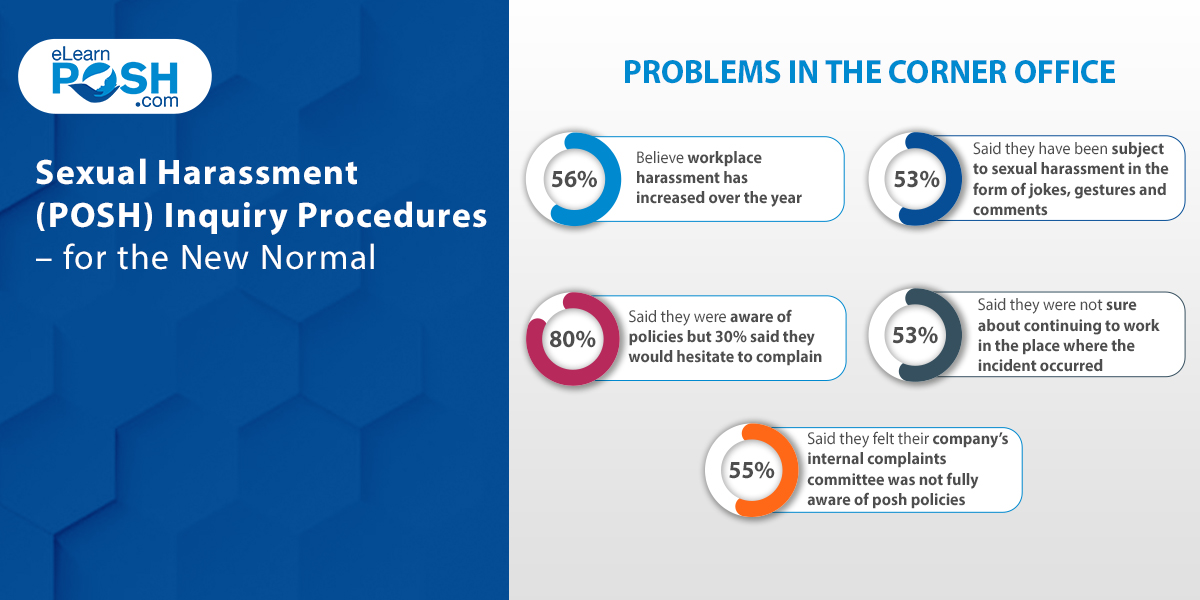
This post is part of the “Comprehensive Guide to POSH Compliance in the New Normal”. If you wish to view the Main blog, click here.
Inquiry Procedures
The new normal has introduced several challenges to our erstwhile normal working procedures. While certain types of Sexual Harassment might see a reduction (particularly physical harassment) there are other types of sexual harassment which have seen drastic increase (such as visual, verbal & cyber harassment). This is visible in the Gartner’s Survey published during the early stages of the pandemic. This increase coupled with huge amount of digital surveillance and tracking data, and difficulties in conducting in-person inquiries would change the way these procedures are followed.
Get answers and FREE consultations for all your POSH related queries. Click here Join our ‘Not-for-profit’ LinkedIn group.
Timeline
The first impact is on the timeline from the receipt of the complaint to the inquiry completion. The law is very clear in this aspect. Chapter IV, Section 11, Sub section 4 reads:
“The inquiry shall be completed within a period of ninety days”
This doesn’t give any option for the Internal Committee to stretch the inquiry beyond the stipulated 90-day period. If it was “The inquiry may be completed” the IC can take this 90-day time limit lightly. Having said that, the Supreme Court recognizes the extraordinary nature of the situation posed by the pandemic and has passed an Order on a Suo Motu petition on 23rd March 2020. Here is an extract:
“it is hereby ordered that a period of limitation in all such proceedings, irrespective of the limitation prescribed under the general law or Special Laws whether condonable or not shall stand extended w.e.f. 15th March 2020 till further order/s to be passed by this Court in present proceedings.”
The complete order is available here.
Based on this, if the IC feels that the inquiry cannot be effectively completed within the period, due to delays caused by the pandemic or related issues, IC may take additional time to complete the inquiry. Reasonable delay in delivering the accurate verdict should be acceptable. This delay must be documented and reported in the Annual Report of the IC, including the steps taken to expedite the inquiry and any interim measures to prevent aggravation of the situation as may be required.
Attendance
Securing attendance of the complainant, respondent or the witness may be difficult during the WFH or lockdown times. It may not be easy for some, to attend these from home due to family or social pressures. Section 19 (e) of the PoSH Act considers that it is the duty of the employer to:
“assist in securing the attendance of respondent and witnesses before the Internal Committee or the Local Committee, as the case may be;”
The employer must make every effort to ensure participation of the respondent, witness and even the complainant if they are employees of the organization. If their attendance cannot be secured, after reasonable number of attempts to reschedule, IC may decide on the complaint ex-parte.
Confidentiality
In an in-person inquiry, IC members may request the party to turn-off the mobile phones or turn the silent mode on. The environment is a lot more controllable. If the proceedings are recorded (usually audio), it is purely for the purpose of drafting the statement and would be done by the IC. But in a virtual scenario, this is difficult to control and can be intimidating or concerning for the witness, complainant or the respondent to appear on a virtual video conference inquiry.
It is very important to revise the confidentiality clause and only one person should be authorized to record the proceedings. Statement of confidentiality and acceptance to not record the proceedings must be signed by everyone involved, except the one authorized to record. Every step to assure confidentiality must be taken.
Verification
As the inquiries are conducted virtually, IC members must perform an additional step to verify the identity of the individual present on the other side. While there is no prescription on the level of verification, it may be decided by the IC to their satisfaction. This is more of a precautionary step. If there is any suspicion during the inquiry, IC must pause and confirm the identity before proceeding.
It is also important for the IC to ascertain that the party (witness, complainant or the respondent) is alone during the inquiry to avoid any external influence in the inquiry.
Insisting Video Inquiry
Using a video call may provide IC to observe the body language of the party on the other side. But the concerns of the party on the other side about their privacy and video getting leaked are also genuine. While I have heard the argument on both sides, I feel the jury is still out on this one.
There is a view that Internal Committee has the power of Civil Court and the court proceedings are conducted on a video call, so IC members can also insist the inquiry on a video call.
On the other hand, confidentiality in a Sexual Harassment Inquiry is paramount for both parties as it can cause unnecessary damage to the reputation of the individuals involved.
Both has its merits. But the Act reads as follows.
“Provided further that where both the parties are employees, the parties shall, during the course of inquiry, be given an opportunity of being heard and….”
As the act uses the word “heard” instead of “seen” an audio inquiry is not totally wrong if the IC feels convinced that it provides sufficient information to proceed. The IC may try to convince the party for a video inquiry, but if objected, IC may use video to complete the verification, document the objection and proceed with an audio call.
Statement
After every inquiry, IC is required to transcribe the proceedings in detail and take a signature from the complainant, respondent or the witness as it may apply. But with the proceedings being virtual, IC must still continue to draft the statement and send it as part of the email to the individuals involved in that inquiry. All the individuals must confirm receipt and acknowledge the same by email. This email must be printed by the IC member and certified as original with a physical signature. For more details on preserving digital statements and evidences, refer to Evidence section of this blog.



The analysis results gives more in-depth knowledge on employees emotions and their concerns.